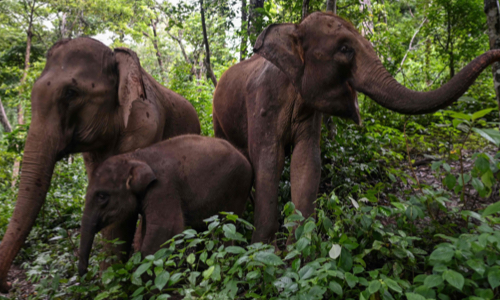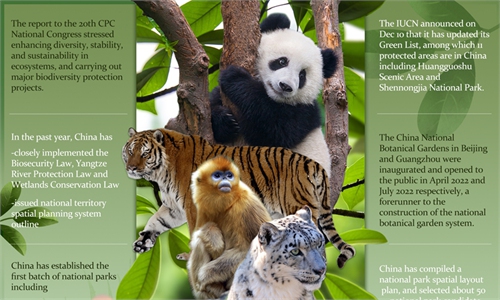ARTS / CULTURE & LEISURE
Yunnan Province's star elephants: new members, new families and new life
Sharing the good news

Elephants wander in Yunnan Province. File photo: VCG
Who were the most popular animal stars on the internet in 2021? One of the top answers has to be the wandering elephants of Southwest China's Yunnan Province.
They set out from the rainforest, passed through cities and villages, wandered through valleys and fields, crossed hills and rivers, and finally returned to their home. The journey of the 15-member family took 124 days and covered more than 1,400 kilometers.
The adventurous elephants became famous not only in China, but all over the world. The BBC described their migration as a Tolkien-style "epic journey," and video clips of the elephants were viewed millions of times on YouTube.
A year on, their story is still going.
Recently, elephant protectors from Yunnan shared updates about the elephant herd - it has welcomed some new members and has separated into two growing herds.
The miraculous story of the Asian elephants in Yunnan is a microcosm of China's biodiversity conservation efforts in recent years.
Thriving herd
The second phase of the 15th meeting of the Conference of the Parties to the UN Convention on Biological Diversity, known as COP15, is currently being held in Montreal, Canada.
During the event, the good news about the famous Yunnan elephants was unveiled.
"The 'short-nosed family' has grown bigger. In the past year or so, new members have been added and a new group has been established," an Asian elephant monitor said.
In January, the herd gave birth to new baby elephants.
Recent monitoring found that the newborn baby elephants have grown to about 200 kilograms. They were drinking water, eating fresh leaves and playing with their mothers in the wild, the Global Times learned from the Ministry of Ecology and Environment.
Another important discovery: The original herd of elephants has split into two, forming new families while looking for new partners. The two groups are now active in different locations in the Xishuangbanna National Nature Reserve.
Wang Bin, director of the Asian elephant protection and management center in the Xishuangbanna Dai autonomous prefecture of Yunnan, explained that the separation and reunion of elephant groups shows that the local groups communicate frequently and the population of elephants is constantly growing.
Although they no longer travel long distances, after the experience of 2021, the Asian elephants will take short "outings" from time to time to visit each other.
At present, the "short-nosed elephant group" is very young with the eldest being no more than 30 years old. Under the careful protection of the local government and the public, every member of the elephant herd is in good health and has sufficient food.
During their epic journey in 2021, a baby elephant was born. The scene of the elephant mother helping the baby elephant across a ditch melted the hearts of many netizens. Now, the baby elephant has grown up and is much stronger.
During 2021's northward migration, a large amount of manpower and material resources were mobilized to help the herd: more than 25,000 police and staff, 973 drones, 15,000 emergency vehicles, 150,000 evacuated residents along the journey and 180 tons of elephant food.
Luckily, the entire process was under the protection and close monitoring of the local government, and residents showed great cooperation, understanding and tolerance.
In the end the elephants returned home safely.
Growing population
Yunnan is an important habitat for Asian elephants. The development and growth of the "short-nosed family" is the result of local people's great efforts in protecting the giant mammals.
In the context of the declining number of elephants in the world, the population of wild Asian elephants in Yunnan has increased from about 150 to more than 300 over the past few decades.
Scientists and ecological protection workers have found that almost every elephant herd has baby and young elephants, and new members are born every year.
Ecologists stress that Asian elephants are known as "rainforest engineers" and an "umbrella species" of the forest ecosystem. Thus, efforts to protect Asian elephants also protect biodiversity and the region's ecological balance.
In Yunnan, protecting Asian elephants has become a social affair involving every resident. An elephant monitoring and early warning platform has been built, public liability insurance for wild animals has been established, and the construction of a national park for Asian elephants is being promoted.
China, the country currently holding the COP15 presidency, has made great achievements in biodiversity protection.
At present, Asian elephants have been listed as one of 48 critically endangered species under rescue and protection during the 14th Five-Year Plan (2021-25) period in China.




